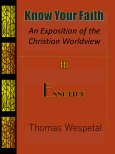





Volume 3
Essence
Introduction to Volume 3
What is God like? How can we describe His nature? We discovered in the last volume that the most reliable source of God’s self-
We will attempt to describe God’s nature from three vantage points: (1) His qualities or “attributes,” (2) His triune nature, and (3) His relation to creation. The initial chapter, however, raises the crucial question as to whether one can know God at all and to what degree. We will defend the position that God’s essence can be truly known, but that our knowledge of God will never be exhaustive. Along with the medieval scholar Thomas Aquinas, we affirm that our knowledge of God is analogical, that is, we can understand God’s general characteristics, but only to the degree that the human mind can comprehend them. Consequently, we will refute the claims of apophatic theology that God’s essence cannot be known in any sense.
In considering God’s attributes, we will employ the following categories for classification: God’s greatness, God’s holiness, and God’s love. In saying that God is “great,” we affirm that He is living, personal, immaterial, unchanging, infinite, eternal, almighty, all-
In examining God’s triune nature, we will affirm that there is only one God who, nonetheless, exists in three co-
In the context of discussing the Trinity, we will defend the full deity and humanity of God the Son, Jesus Christ, attempting also to define the relationship between His two natures. We will conclude that these two natures subsist in one, divine-
The final section covers God’s relation to the created order. This section provides a contrast with the previous section in that the former investigates the relationships within the Godhead, while the latter relates to things outside of God, that is, to His creation.
In “unpacking” God’s relationship with creation, we first affirm God as Creator and Sustainer. This volume will defend the position that God created the Earth in the space of six literal days about 6000 years ago. Next, we will study the first beings created by God, the angels, in the context of the biblical description of His majesty. The following chapter expounds on the themes of God’s transcendence and immanence, that is, His “orientation” to the created order.
The next topic is also the most controversial – God’s sovereignty. We will include discussions on God’s providence in historical events and the occasional “violation” of the natural order by miraculous interventions. A troubling question is the seeming contradiction between God’s sovereignty and human freedom. This volume defends the Arminian position, affirming true human freedom, contrary to the deterministic views of Calvinism.
The most problematic issue concerning God’s sovereignty is the so-







